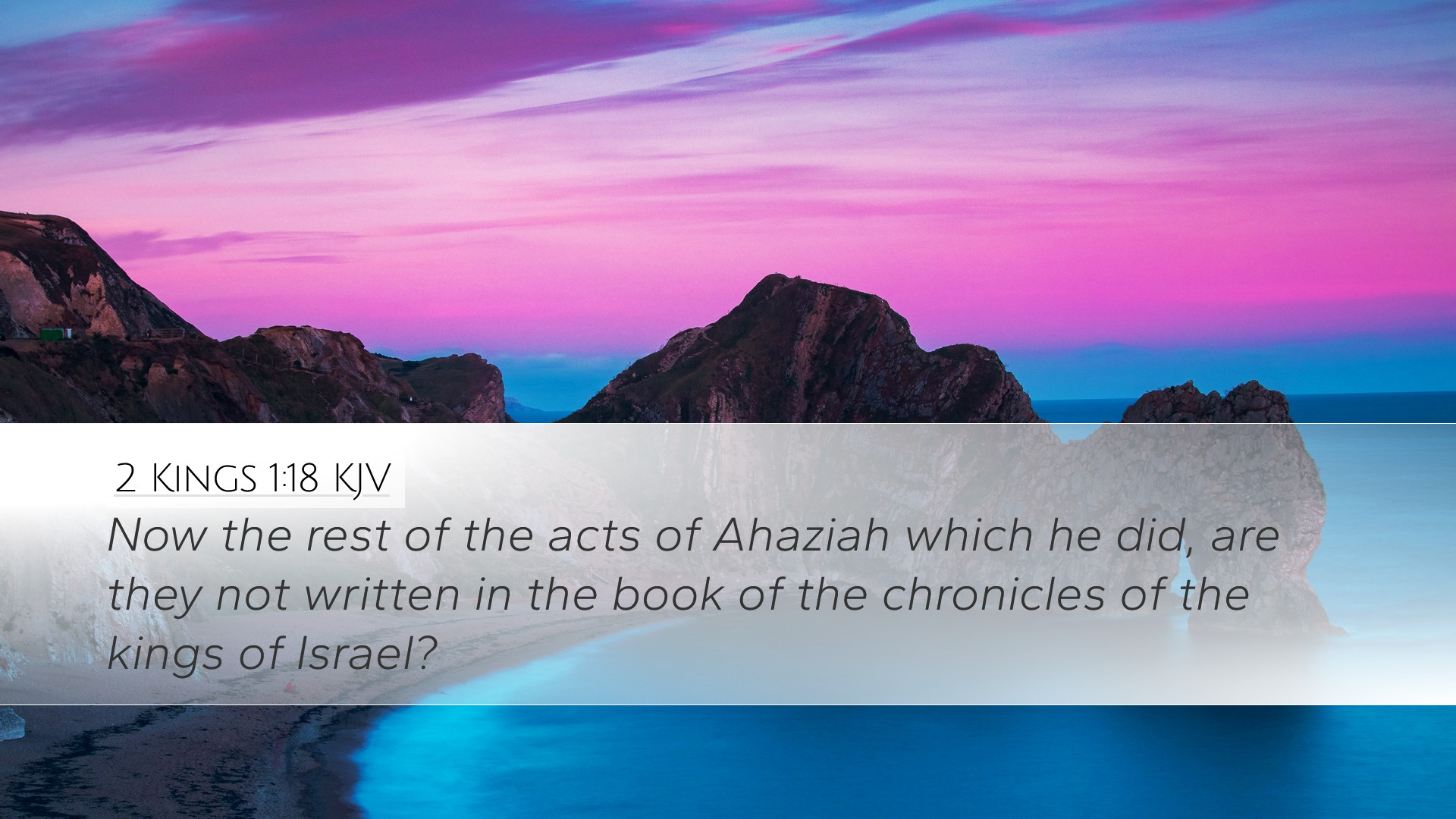Old Testament
Genesis Exodus Leviticus Numbers Deuteronomy Joshua Judges Ruth 1 Samuel 2 Samuel 1 Kings 2 Kings 1 Chronicles 2 Chronicles Ezra Nehemiah Esther Job Psalms Proverbs Ecclesiastes Song of Solomon Isaiah Jeremiah Lamentations Ezekiel Daniel Hosea Joel Amos Obadiah Jonah Micah Nahum Habakkuk Zephaniah Haggai Zechariah Malachi2 Kings 1:18
2 Kings 1:18 KJV
Now the rest of the acts of Ahaziah which he did, are they not written in the book of the chronicles of the kings of Israel?
2 Kings 1:18 Bible Commentary
Commentary on 2 Kings 1:18
Introduction
The verse 2 Kings 1:18 reads: “Now the rest of the acts of Ahaziah which he did, are they not written in the book of the chronicles of the kings of Israel?” This verse serves as a concluding remark to the narrative concerning King Ahaziah, providing both a historical and theological insight into his reign. This commentary synthesizes insights from renowned public domain commentaries, particularly those by Matthew Henry, Albert Barnes, and Adam Clarke, to offer a comprehensive understanding of this text for pastors, students, theologians, and Bible scholars.
Historical Context
Understanding Ahaziah's Reign
Ahaziah, the son of Ahab and Jezebel, ascended to the throne of Israel after the death of his father. His reign, though short-lived, is marked by significant events that reflect the general state of the Israelite kingdom during this period. The open apostasy and idolatrous practices instigated by his parents had a lasting influence on him. The chronicler’s references to the “book of the chronicles of the kings of Israel” indicate a desire for historical accuracy and accountability in the assessment of kingship.
Theological Implications
The Acts of Ahaziah
Matthew Henry asserts that the mention of the chronicles serves not only as a historical record but also as a somber reminder of the failure of Ahaziah’s leadership. His acts were not merely political; they directly correlated with the spiritual condition of Israel. Albert Barnes elaborates, emphasizing that the King’s ways should be seen as reflective of his moral standing and relationship with God. The books of chronicles aimed to present a moral commentary on the reigns of kings, assessing them based on their fidelity to God and the repercussions of their actions on the nation.
Contrast with Biblical Narratives
Adam Clarke underscores a critical aspect: the legacy of Ahaziah stands in stark contrast with that of his predecessors and successors. The biblical text reflects a recurring theme where the success of kings is tied to their adherence to the covenant with God, while failure incurs divine judgment. Ahaziah's lack of relationship with Yahweh meant that his deeds were marked by the futility of human ambition devoid of divine guidance.
Literary Structure
Concluding Remarks
This verse forms a literary wrap-up to Ahaziah's story. As noted by Barnes, such formulas are common in the historical books of the Old Testament, providing a consistent structure for summarizing the lives of various rulers. It signifies a transition point, allowing readers to reflect on the narrative just concluded before moving on to the reign of the next king.
Reflection on Leadership
The Role of a Leader
From Ahaziah’s story, we glean important lessons on the pursuit of leadership that aligns with divine principles. Matthew Henry asserts that godly leadership is marked by humility, faithfulness, and seeking the welfare of the people rather than personal ambition. Ahaziah’s reign demonstrates the consequences of turning away from these virtues.
Church leaders today may draw parallels from this text, recognizing the importance of leading with integrity and submission to God’s will. The failure of Ahaziah stands as a poignant reminder that leadership in accordance with divine directive leads to lasting impact, while a life lived in rebellion ultimately results in judgment.
Conclusion
Ahaziah's acts, as summarized in 2 Kings 1:18, encourage readers to reflect deeply on divine accountability. The chronicler's mention of the chronicles of the kings signifies a broader narrative that seeks to convey moral truths about God's sovereignty and the importance of covenant fidelity. The reflections drawn from the writings of Matthew Henry, Albert Barnes, and Adam Clarke provide rich insight into how this verse fits into the overarching story of Israel and serves as a beacon for maintaining godliness in leadership.
This commentary invites further study and encourages readers to engage with the Biblical text and its relevance in today's context.


